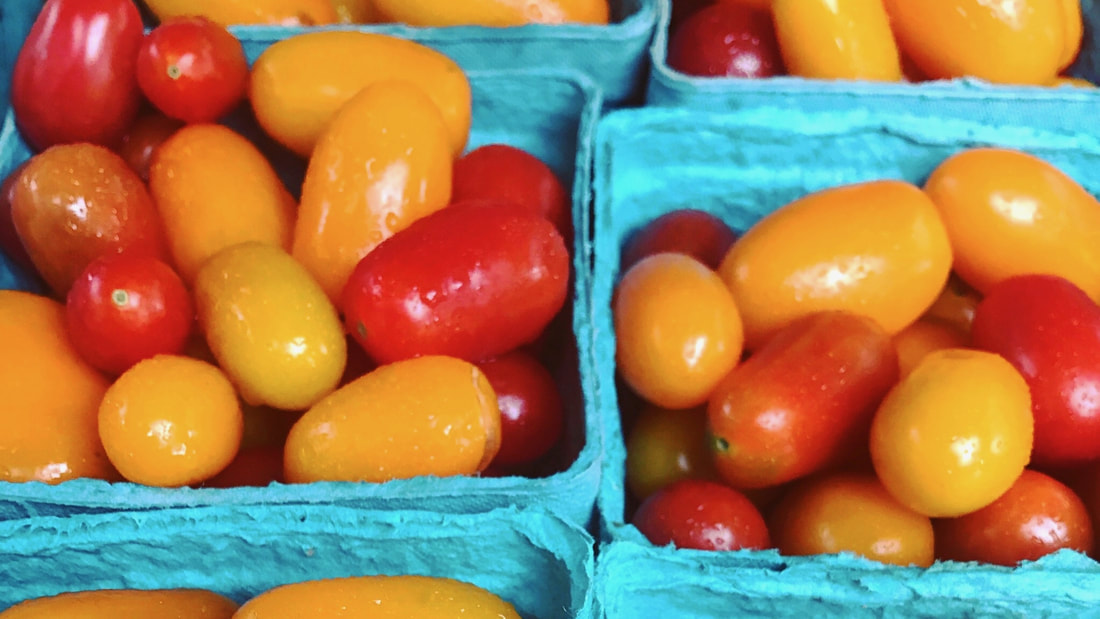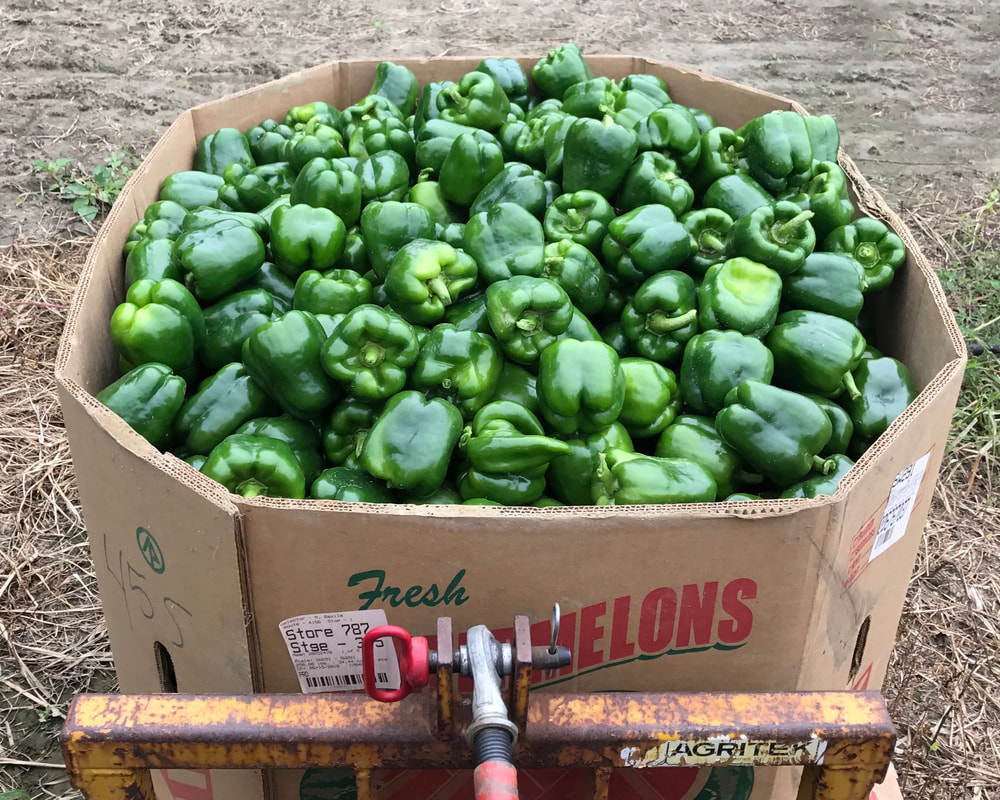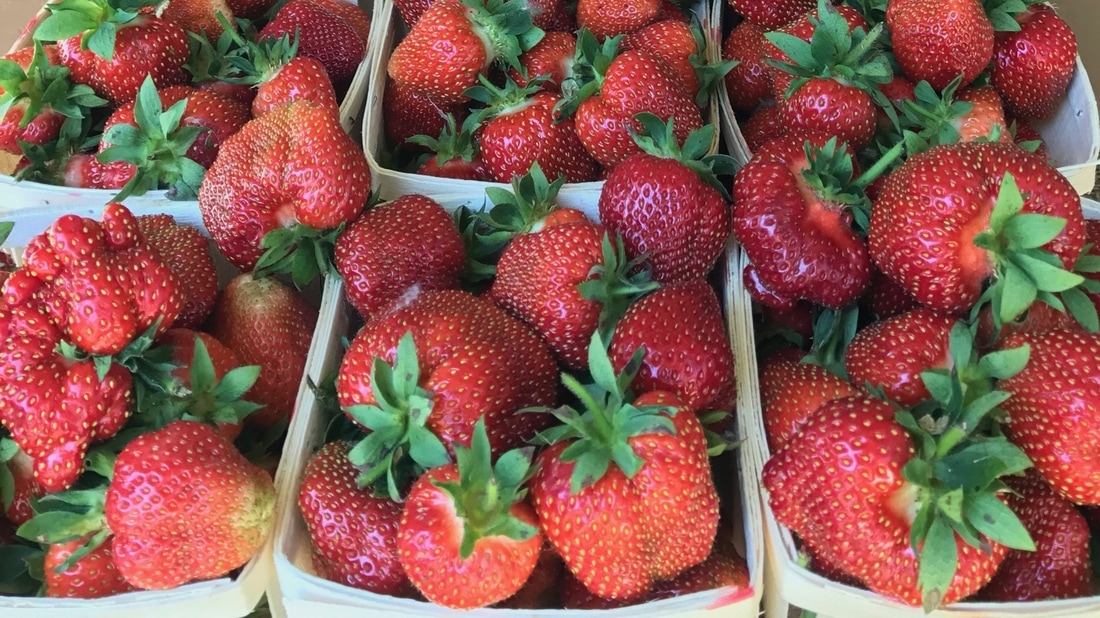|
It's tomato season and we're stocking multiple varieties of mixed grape, plums and classic rounds. Whether your making sandwiches, simmering sauce or just snacking, tomatoes are really good for you. Find out why our summertime favorite is so healthy! The tomato is one of the healthiest salad foods because it contains lycopene, which offers protection from some cancers and compounds to help prevent blood clots.
Tomatoes are a major source of dietary lycopene, a carotene antioxidant that fights heart disease and may help prevent cancer. Tomatoes also have a anticoagulant effect because of the salicylates contained in them. They also contain several other antioxidants including vitamin C, quercetin, lutein. Tomatoes are low in calories but high potassium and contain useful amounts of fiber. The Good Stuff:
Facts:
Tips:
For more Homegrown News subscribe to my newsletter! Reference: 100 Best health Foods, Eat This Not That, Cooking Light What to Eat Like or Tweet this article to a friend by clicking the badges below. Thank you for your support.
0 Comments
We've been picking peppers for several weeks now and the yields have been promising. Every time we harvest I can't help but think about what goes on inside the individual fruit I pick. It turns out peppers are really-really good for you and help prevent so many health issues. Find out why peppers are so amazing by reading more below! Bright colored peppers contain high levels of carotenes for heart health and cancer protection, and are also a rich source of vitamin C.
Peppers come in a variety of colors but the red and orange ones contain the highest level of vitamin B6 and carotenes. However all of them are extremely rich in vitamin C with an average serving producing more than a days recommended intake. In general, the deeper color of the pepper the more beneficial plant compounds it contains. These include bioflavonoids, to protect against cancer, and phenols which helped block the action of cancer-causing chemicals in the body. Peppers also contain plant sterols, which may have an anticancer effect. The Good Stuff:
Facts:
Tips:
For more Homegrown News subscribe to my newsletter! Reference: 100 Best health Foods, Eat This Not That, Cooking Light What to Eat Like or Tweet this article to a friend by clicking the badges below. Thank you for your support. Strawberries have been on our stand for over a week now and they are always met with great fanfare. We think of them as dessert or a quick snack, but did you know how awesome they are for you? Rich and vitamin C strawberries boost the system and contain chemicals that offer cancer protection.
Strawberries rank very high in antioxidant activity. They are extremely rich in vitamin C (an average portion contains the entire recommended daily amount for an adult) and this helps to boost the immune system and help wound healing, prevent arterial damage, promote iron absorption, and strengthen blood vessel walls. They also contain other antioxidant phenolic plant chemicals such as anthocyanins and ellagic acid, which can block cancer cells and can help prevent some cancers. Lastly they contain good amounts of fiber, folate and potassium. The Good Stuff:
Tips:
Related: For more Homegrown News subscribe to my newsletter! Reference: 100 Best health Foods, Eat This Not That, Cooking Light What to Eat Like or Tweet this article to a friend by clicking the badges below. Thank you for your support. We love it for its intense flavor and it will always be a staple in our kitchens, but did you know “the stinking rose” has been used for centuries as a home remedy. Read why garlic is the food of the gods! Valued as a health-protector for thousands of years, garlic bulbs are a useful antibiotic, and can also reduce the risk of both heart disease and cancer.
Although often used in small quantities, garlic can still make an impact on health. It is rich in powerful sulfur compounds that cause garlic's strong odor but are the main source of its health benefits. Research has found that garlic can help minimize the risk of both heart disease and many types of cancer. It is also a powerful antibiotic and inhibits fungal infections such as athlete's foot. It also appears to minimize stomach ulcers. Eaten in reasonable quantity, it is also a good source of vitamin C, selenium, potassium, and calcium. The Good Stuff:
Facts:
Related: For more Homegrown News subscribe to my newsletter! Reference: 100 Best health Foods, Eat This Not That, Cooking Light What to Eat Like or Tweet this article to a friend by clicking the badges below. Thank you for your support. Hatfield asparagus is known far annnnnnd wide and its almost here! Every time we put this out on the stand we get excited, it kicks off the season, and folks drive from all over to grab a few bunches. Not only does the "lobster" of vegetables taste incredibly good, it's a superfood. So many health benefits, we lost count! Asparagus is an anti-inflammatory (reduces inflammation in the body) and contains a type of fiber that keeps the digestive system healthy. The plant chemical glutathione contained in asparagus has been found to be an anti-inflammatory and may help rheumatoid arthritis symptoms. This vegetable is also rich in soluble fiber oligosaccharide, which acts as a prebiotic in the gut by stimulating the growth of friendly bacteria. It is also a valuable source of vitamin C, folate, magnesium, potassium, and iron. Unusually for a vegetable, it is a good source of vitamin E, an antioxidant that helps keep the heart and immune system healthy.
The Good Stuff:
Facts:
Tips:
For more Homegrown News subscribe to my newsletter! Reference: 100 Best health Foods, Eat This Not That, Cooking Light What to Eat Like or Tweet this article to a friend by clicking the badges below. Thank you for your support. Beautiful crowns of our green broccoli varieties will soon be available at our farmstand, picked fresh first thing in the morning and ready for pickup when you get out of work. We have two new varieties coming, "Green Magic" and "Marathon", both earthy, savory, and robust. Incredibly good for you too! Have a look below and see why you should be eating broccoli everyday. Of all vegetables in the Brassica family broccoli has shown the highest levels of protection against prostate cancer. Broccoli comes in several varieties but the darker the color the more beneficial the nutrients the vegetable contains. It contains sulforaphane and indoles, which have strong anticancer benefits particularly against breast and colon cancer. Broccoli is also high in flavonoids, which have been linked with a significant reduction in ovarian cancer. The chemicals in broccoli protect against stomach ulcers, stomach and lung cancer, and possibly skin cancer. They also act as a detoxifier helping lower bad blood cholesterol, boosting the immune system, and protecting against cataracts.
The Good Stuff:
Facts:
Tips:
For more Homegrown News subscribe to my newsletter! Reference: 100 Best health Foods, Eat This Not That, Cooking Light What to Eat Like or Tweet this article to a friend by clicking the badges below. Thank you for your support. Did you know eggplants used to have spines and bananas had huge seeds? You bet they did. Humans started domesticating crops about 10,000 years ago. Since then, we've developed farming techniques to breed food to taste better, be more nutritious, live in different environments, and now look way, way different. Check out this video about fruit and vegetable history, it's pretty interesting. Reference: Business Insider For more Homegrown News subscribe to my newsletter!
Like or Tweet this article to a friend by clicking the badges below. Thank you for your support. Pretty soon our farmstand will be stocked with all those pre-summer sweet leafy greens! And don't you fret, spinach will be high on that list. This season we will be stocking two varieties, Banjo and Admiral. Each promise to be sweet, earthy, and robust, perfect for salads, side dishes, smoothies, and juicing. With all the health benefits and versatility in the kitchen, have a look below and see why Spinach is so popular. Contrary to popular belief, spinach doesn't contain as much iron as originally thought but, nevertheless it has many excellent health benefits!
Researchers have found many flavonoid compounds in spinach at as antioxidants and fight against stomach, skin, breast, prostate, and other cancers. Spinach is also extremely high and carotenes which protect eyesight. It is also particularly rich in vitamin K which helps to boost bone strength and may help prevent osteoporosis. In addition, spinach also contains peptides which are aspects of proteins that have been shown to lower blood pressure, and its relatively high vitamin E content may help protect the brain from cognitive decline as we age. The Good Stuff:
Facts:
Tips:
For more Homegrown News subscribe to my newsletter! Reference: 100 Best health Foods, Eat This Not That, Cooking Light What to Eat Like or Tweet this article to a friend by clicking the badges below. Thank you for your support. |
AboutFollow Bardwell Farm and all of our adventures here! Archives
April 2024
Categories
All
Gift CardsGive the gift of a CSA farm share or farmstand goods with gift certificate from Bardwell Farm! NewsletterSubscribe to Harry's Farmstand Monthly newsletter! |
DIRECTIONS |
|
|
©2022 BARDWELL FARM, ALL RIGHTS RESERVED
|




 RSS Feed
RSS Feed


